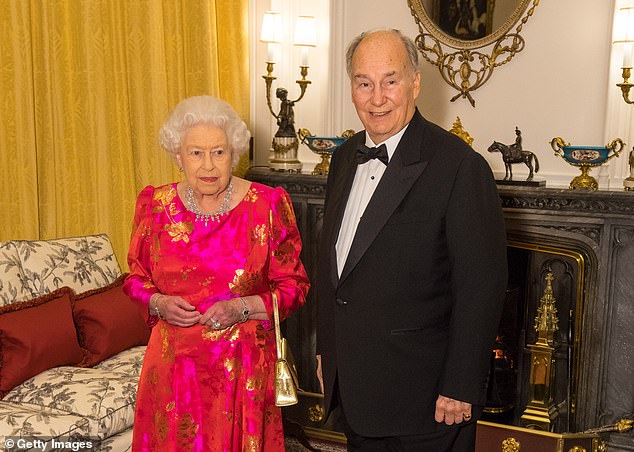The Aga Khan, a spiritual leader, philanthropist and one of the world’s richest men, has died aged 88.
Most often in the public eye thanks to his racehorses, the British citizen was the religious head of the Ismaili sect of Islam, which has as many as 15 million members.
He inherited his title from his grandfather in 1957 aged just 20 and is believed by his followers to be ‘the bringer of life’.
In spite of his sometimes turbulent private life he remained revered for the worldwide charitable works he has directed funds to.
He died peacefully in Lisbon, Portugal, today surrounded by his family. An announcement on his successor will come later, the Aga Khan Foundation has said.
The King was tonight made aware of the Aga Khan’s death and was said to be deeply saddened by the loss of a personal friend of many years. He is believed to be in touch with his family privately.
In an announcement on social media, the Aga Khan Development Network said: ‘His Highness Prince Karim Al-Hussaini, Aga Khan IV, 49th hereditary Imam of the Shia Ismaili Muslims and direct descendant of the Prophet Muhammad (peace be upon him), passed away peacefully in Lisbon on 4 February 2025, aged 88, surrounded by his family.





‘Prince Karim Aga Khan was the founder and chairman of the Aga Khan Development Network. The announcement of his designated successor will follow.
‘Leaders and staff of the Aga Khan Development Network offer our condolences to the family of His Highness and to the Ismaili community worldwide.
‘As we honour the legacy of our founder, Prince Karim Aga Khan, we continue to work with our partners to improve the quality of life for individuals and communities across the world, as he wished, irrespective of their religious affiliations or origins.’
The Aga Khan, whose ancestors fled Persia for India two centuries ago, was born in Switzerland and spent much of his later life in France, despite having British citizenship.
His followers say he was a direct descendent of the Prophet Mohammed through his daughter, Hazrat Bibi Fatima, and the Prophet’s cousin and son-in-law, Hazrat Ali.
Described by Vanity Fair as a ‘one man state’, alongside a colourful personal life his charities are famous for their work in poor and war-torn parts of the world.
The extent of the Aga Khan’s financial empire is hard to measure. Some reports estimated his personal wealth to be in the billions.
The Ismailis – a sect originally centered in India but which expanded to large communities in east Africa, Central and South Asia and the Middle East – consider it a duty to tithe up to 10 per cent of their income to him as steward.
His first wife was British model Sally Croker-Poole, who he married in 1969. They had two sons and a daughter. Eldest son Prince Rahim, 53, is expected to be his official successor.
That first marriage ended after 25 years, and he married Princess Gabriele zu Leiningen in 1998 at his huge Aiglemont estate, near Paris. She is a German former pop singer who converted to Islam for her marriage, and adopted the new name of Inaara.
The couple had a son, but after six years announced their separation. In the course of their highly publicised break-up it was claimed that the estranged wife hired surveillance experts to prove her belief that her husband was having an affair.
The Aga Khan’s vast wealth allowed him to run a £100m yacht, named Alamshar after one of his racehorses. He also owned the infamous Shergar, who was stolen by gunmen in Ireland in 1983 and never seen again.





He was also a skiing fanatic – even racing for Iran in the 1964 Winter Olympics.
The Aga Khan Centre in London is home to the Aga Khan Foundation, the Aga Khan University’s Institute for the Study of Muslim Civilisations, and the Institute of Ismaili Studies.
In 2023 the Aga Khan Foundation poured a total of £58.13million into charitable activities with the aim of promoting and providing for the advancement of education, health, rural development, the environment and support to civil society organisations for the public benefit.
The UK Government has worked closely with the AKDN in Central Asia and Tanzania, as well as in Afghanistan where the Aga Khan Foundation implement Department for International Development programmes including delivering an education programme under the Girls’ Education Challenge.
It says it works in over 30 countries and has an annual budget of about $1 billion for nonprofit development activities.
A network of hospitals bearing his name are scattered in places where health care had lacked for the poorest, including Bangladesh, Tajikistan and Afghanistan, where he spent tens of millions of dollars for development of local economies.
He also founded the Nation Media Group, the largest independent media organisation in east and central Africa.
A defender of Islamic culture and values, he was widely regarded as a builder of bridges between Muslim societies and the West despite – or perhaps because of – his reticence to become involved in politics.
As a statesman, the Aga Khan facilitated diplomatic talks at regional and global levels, including the landmark 1985 summit between Presidents Reagan and Gorbachev in Geneva.




The organisations work to promote understanding about Muslim cultures and to connect the public to global development issues.
Alongside his charities, the Prince owned the largest horse racing and breeding operation in France.
He was most famously the lead owner of Shergar, who won the Epsom Derby in spectacular fashion with a record-breaking lead of ten lengths in 1981.
With a white blaze on his face and white socks he was an instant favourite with the fans – before he was retired aged three to one of his Irish stud farms.
But in a shocking case he was kidnapped along with his groom John Fitzgerald in February 1983 from his stud farm in Ballymanny, County Kildare, by a group of masked men.
Whilst Fitzgerald was soon released, the thieves – who investigators believe were members of the IRA – demanded £2million for Shergar’s return.
After a series of phone calls, the kidnappers broke off contact and the magnificent horse was never seen again.
The Aga Khan is survived by his children Princess Zahra, Prince Rahim, Prince Hussain and Prince Aly Muhammad, his brother Prince Amyn Muhammad, half-sister Princess Yasmin, and four grandchildren.






The Aga Khan was the eldest son of Prince Aly Khan by his first wife, Joan Yarde-Buller, and spent his early life in Nairobi, Kenya, after being born in Geneva in 1936.
He attended the Institut Le Rosey in Switzerland before graduating from Harvard University in 1959 with a Bachelor of Arts Degree in Islamic history.
When he returned to the university following an eight-month break when he succeeded his grandfather, he said it was ‘a big joke on campus’ with his classmates calling him ‘Jesus’.
‘I was an undergraduate who knew what his work for the rest of his life was going to be,’ he said in a 2012 interview with Vanity Fair magazine. ‘I don’t think anyone in my situation would have been prepared.’
The Aga Kahn III broke with 1,300 years of tradition to make Prince Karim Al-Hussaini his successor, allowing the title to skip over a generation.
He said in his will: ‘In view of the altered conditions in the World in very recent years, including the discoveries of atomic sciences, I am convinced that it is in the best interest of the Shia Muslim Ismailian Community that I should be succeeded by a young man.’
Treated as a head of state, the Aga Khan was given the title of ‘His Highness’ by Queen Elizabeth in July 1957, two weeks after his grandfather unexpectedly made him heir to the family’s 1,300-year dynasty as leader of the Ismaili Muslim sect.
He became the Aga Khan IV on Oct. 19, 1957, in Dar es Salaam, Tanzania, on the spot where his grandfather once had his weight equaled in diamonds in gifts from his followers.
His eye for building and design led him to establish an architecture prize, and programs for Islamic Architecture at MIT and Harvard. He restored ancient Islamic structures throughout the world.
The Aga Khan will be buried in Lisbon. The date was not released.

